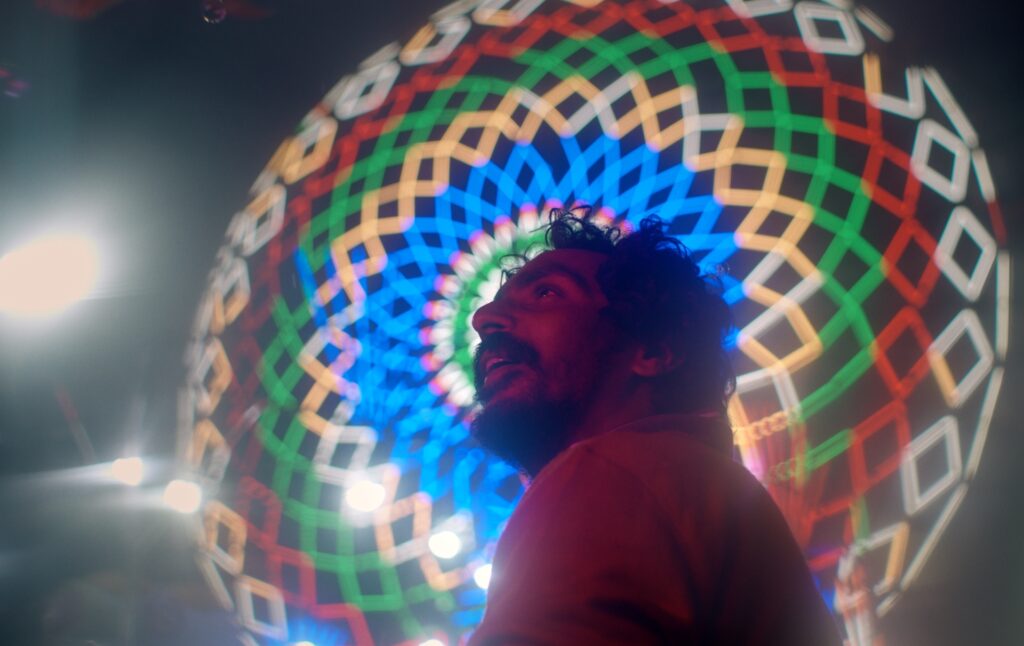Jitank Singh Gurjar’s debut feature in the Braj language spoken in West Uttar Pradesh in North India, Vimukt (In Search Of The Sky), is a stark social inquiry into the slow violence of poverty. The film shows how penury corrodes the fragile bonds that hold a family together, leaving behind a quiet ache that lingers long after it ends.
Jasrath (Raghvendra Bhadoriya) labours in a brick kiln to sustain his family in a village in Uttar Pradesh while his wife, Vidya (Meghna Agarwal), tends to their differently abled son, Naran (Nikhil Yadav). As the great Kumbh Mela unfolds nearby, Vidya urges her husband to join the pilgrimage, only to be met with his curt refusal as they simply cannot afford it. Naran drifts through the village, playing with children younger than himself, enduring the taunts of older boys, and falling into scuffles that leave Jasrath shamed and powerless. When one such humiliation proves unbearable, Jasrath, unable to confront his tormentors directly, makes a surprising decision to take his family to Kumbh…
The themes of familial duty and sacrifice have long provided filmmakers with fertile ground for psychological and moral inquiry. Gurjar, grimly attentive to the drab particulars of Jasrath, Vidya, and Naran’s daily existence, resists the temptation either to sentimentalise their plight or to vilify their shortcomings. He presents them plainly, and in that plainness they acquire a rare authenticity amid the bucolic rhythms of northern India. On the surface, this is a placid existence, yet beneath it lies a society quick to profit from another’s misfortune or jibe at it.
The film is set in a land where cattle are grazed at dawn and villagers gather at dusk to sing folk songs in temple courtyards. Men depart each morning to earn their daily bread, while customs as deep-seated as the taboo against touching a pig still shape communal life. The community’s callousness is laid bare in the suggestions of Vidya’s neighbours, who urge her to take the family to the Kumbh Mela, hinting that the pilgrimage might cleanse past-life sins, a cruel insinuation about Naran’s disability. The young men of the village are no kinder, goading the boy into smoking or striking him outright. Even within the family, betrayal lingers. Jasrath’s cousin Balli, who once cheated him, now presses him to sell his land for the promise of a commission. It is against this atmosphere of corrosion that the family undertakes the journey to the Kumbh, where vast throngs from across India converge. For Jasrath and his family, the vast confluence is less a destination than a reckoning, as the currents of faith, despair, and resilience entwine. It becomes a place where, in the swirl of ritual and devotion, each member of the family edges toward a fragile form of redemption, personal as well as spiritual.
The film locates tragedy in the smallest of gestures. It is present in the dignity with which Vidya tends to her differently abled son, who remains unaware of the hostility surrounding him. It is also visible in the slow erosion of Jasrath’s composure, as poverty and humiliation corrode his restraint. Gujjar’s screenplay, from a story by Pooja Vishal Sharma, with its unforced empathy for the trio, ensures they are never reduced to caricatures of deprivation. The characters emerge not as emblems of misery but as individuals grappling with the throes of survival.
Though the film treads the path of austere drama, skirting the familiar impulses of mainstream melodrama, its final twenty minutes shift in register. Mostly wordless, the sequence leans on gesture, background score, the occasional use of slow motion, and a montage of the Kumbh that edges toward the melodramatic. The uncertain drift of Jasrath’s thoughts gives the sequence a fragile intensity, suggesting that the darkness within him has not yet lifted. Yet this very uncertainty gives the finale its force, balancing the excesses and reaffirming the filmmaker’s belief in showing the inner turmoils of the three characters through images rather than words.
When it comes to the performances, Raghvendra Bhadoriya imbues Jasrath with a helpless gaze that betrays the insecurity behind his every act, his restraint making his inner conflict all the more legible. Meghna Agarwal’s Vidya embodies grieved stillness, suggesting both endurance and the inevitability of collapse. As Naran, Nikhil Yadav offers a disarmingly natural performance that draws empathy for a man adrift in a world with little kindness.
Shelly Sharma’s cinematography captures both the textures of rural life and the immensity of the Kumbh without resorting to postcard prettiness. Pavan Theurkar’s editing follows the natural rhythms of the village, letting silences linger and moments breathe. Abhijit Shreeram Deo’s sound design works with restraint, weaving ambient textures into the film’s atmosphere. And Manish Kumar’s measured score lends the narrative much of its emotional weight.
Vimukt recently had its world premiere at the 50th Toronto International Film Festival, the lone film in the Centrepiece section. It went on to win the NETPAC Award at the festival.
Braj, Drama, Color


